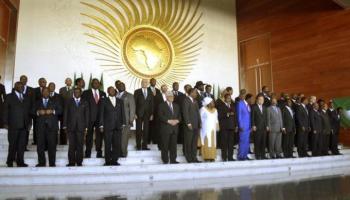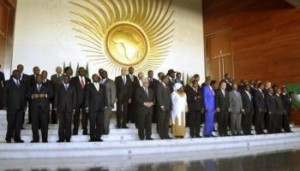Herald
Terence McNamee, Greg Mills and J Peter Pham
Features, Opinion & Analysis
The continued denial of “self-determination” for the Sahrawis is a central argument of the 15-member states who voted against Morocco’s readmission to the African Union.
If Morocco eventually gets its way, “defeat into victory” — a phrase popularised by famed Word War ll Field Marshal William Slim — might prove an apt description of its new approach towards the African Union (AU).
By joining the AU without the Sahrawi Arab Democratic Republic (SADR) exiting the organisation, Rabat appears to have accepted defeat in one key political battle.
But victory in the war is now within reach.
Following a vote this week by 39 (out of 54) African states in favour of its readmission to the AU after a 33-year absence, King Mohammed VI, addressed the 28th AU Summit.
He gushed that Morocco, a founding member of the AU’s predecessor, the Organisation of African Unity (OAU), was coming “back home, after having been away for too long”.
The North African country left the OAU in 1984 after SADR was controversially invited in despite fierce opposition from Morocco and nearly 20 other members.
SADR claims sovereignty over the Western Sahara territory, which Morocco claims as its own.
Until recently Moroccan officials averred that the kingdom could not (re)join unless SADR’s seat at the AU was withdrawn on the grounds that co-membership would be tantamount to recognition.
For decades, the struggle to preserve sovereignty over this disputed territory has come to be viewed as something of a sacred obligation within Morocco.
Until recently it was virtually taboo, something that was never spoken about in terms other than the official narrative — ie the Western Sahara is an ineluctable part of Morocco and always has been, end of story.
For all King Muhammed VI’s genuine popularity and importance to national identity, the existence of the monarchy in its present form was widely seen to be dependent on the outcome in the Western Sahara, since its cause had become a national rallying point almost as important as the royal house’s descent from the prophet Mohammed and the sovereign’s role as “commander of the faithful”.
Perhaps it remains so. But Morocco has opted to change tactics and play the long game.
Retaking a seat in Addis Ababa alongside SADR suggests that Morocco’s leadership is not only assiduous but also increasingly willing to permit civil society, intellectuals and others to contribute to the debate.
It also reckons that African opinion has irreversibly shifted its way.
Support for the Polisario Front — the liberation movement that proclaimed SADR and fought (and largely lost) a war against Morocco until a UN-brokered ceasefire in 1991 (which left the kingdom in possession of virtually the entirety of the territory, including all of its coastline) — is slumping under the relentless weight of Rabat’s nimble diplomacy and economic heft.
The message has finally got through: Morocco is a country of serious political and economic clout, integral to the continent’s development and prepared to play a leading role in its future.
And Morocco comes without preconditions.
But make no mistake: an emboldened Morocco inside the AU may be better placed to effect a final blow to the Polisario’s dreams of real statehood than it ever was outside the continental body.
If that is indeed the thinking, how that process might unfold bears careful consideration.
Consequences for the AU, for regional security and prosperity, and, above all, for the Sahrawi people are sure to be significant.
In human welfare terms, the Sahrawis have most to lose by maintenance of the status quo.
The historically nomadic Sahrawi tribes have long been pawns in regional power plays — most recently involving rivals Morocco and Algeria since Spain withdrew from what was then known as Spanish Sahara in 1976.
The Western Sahara is one of several intractable conflicts that has defied African and wider international efforts to facilitate its “solution” for decades.
At its heart, not unlike Cyprus or Israel/Palestine, lay sharply contrasting interpretations of key historical events, which shape the opposing communities’ identities as well as their sense of justice and what is rightfully theirs.
In general, the international community has been equivocal in the face of each side’s competing claims, encouraging dialogue and emphasising the need for a peaceful resolution.
Only about a quarter of UN member states currently recognise SADR (although, in a number of cases, the ‘recognition’ came in the form of a declaration years ago and the jus legationis has never been exercised) and over the years several have de-recognised it.
Until yesterday’s vote, the AU Commission had, by its own admission, more or less buried its head in the sand. Since 2002, the body did little more than continually reiterate its support of the on-going efforts by the UN to find a solution to the conflict consistent with relevant Security Council and General Assembly resolutions that will provide for the self-determination of the people of Western Sahara.
The continued denial of “self determination” for the Sahrawis is a central argument of the 15 member states who voted against Morocco’s readmission.
In a brief article published in these pages last month, South Africa’s Minister of International Relations and Co-operation used the term no less than eight times in support of SADR’s claim to independence.
It was foreign policy reduced to cookie-cutter platitudes: no acknowledgement that the concept of ‘self determination’ is highly contested terrain not just in Africa but across all continents.
In international law the principle often collides with “territorial integrity”, with no clear track to reconcile the two. Moving negotiations over the Western Sahara to the corridors of the AU will matter not if leading members like South Africa continue to frame “self-determination” exclusively by decolonisation and “all-or-nothing” proposals.
In its crude, Manichean world defined by liberation struggles and race, Pretoria continues to see Morocco as a colonial power.
Unsurprisingly the African National Congress (ANC) has responded negatively to Morocco’s readmission, describing the decision as “regrettable” and “a significant setback to the cause of the Sahrawi people and their quest for self-determination and independence in the Western Sahara”.
Self-determination is not, however, simply a moment of liberation.
Questions of viability — the ability to control, defend and administer a defined territory and population — should be of primary concern.
Africa’s most recent experience of new statehood affords a harrowing reminder.
South Sudan garnered near unanimous support from its own people and overwhelming backing from the international community for its newfound independence in 2011.
Even Khartoum eventually came around to endorsing the breakaway of the south and was the first state to recognise it.
Yet chaos and mass violence in South Sudan has expanded nearly year on year since independence. Worldwide, only Syria is worse.
None of this is to gainsay the strength of nationalist sentiment in Western Sahara. For all Morocco’s investment in the territory and concerted efforts to bring a Sahrawi elite into the establishment, there is no avoiding the continuing perception of an occupation, complete with checkpoints, allegations of mistreatment by security forces and the like. That does not make independence any more of a panacea, but it does illustrate that despite growing acceptance of the Moroccan position within the AU it still has much work to do to counter the almost irresistible lure of “independence” among some Sahrawi communities.
With Morocco inside the AU it seems more likely that attention will focus more and more on the role of Algeria, which is essential to any deal on the Western Sahara. Morocco has always maintained that Polisario is not only backed and funded by Algeria, but in fact has no sovereign decision-making power; its leaders take direct orders from Algiers, which is less committed to the Sahrawi people than it is to anything that might unsettle Morocco. Algeria has used the Western Sahara as a political football in its fight for regional supremacy and a means to consolidate domestic support in a country still struggling with the consequences of its brutal, murky civil war and the myriad sources of potential instability within its borders. But so, to a more limited extent, has Morocco.




